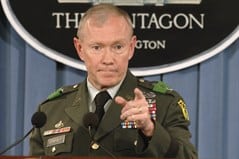General Martin Dempsey, US Chairman of the Joint Chiefs of Staff, gave a lengthy interview to Judy Woodruff on Friday night’s PBS News Hour and delivered a carefully balanced picture of how the U.S. military is managing the unfolding Ukraine crisis, both reassuring European NATO allies that treaty obligations will be honored, while maintaining constant communications with Russian counterparts, to assure there are no miscalculations leading to conflict. Gen. Dempsey, clearly aware of the boundaries between military advice and political decision-making, did not attempt to under-play the danger of conflict, particularly given the occupant of the White House.
Asked by an aggressive Woodruff what kind of message the US is trying to send to Russia, Gen. Dempsey calmly replied that “We’re clearly trying to send a message to Russia, almost exclusively through diplomatic channels, so that I do have an open line with my Russian counterpart that I have used twice the last two days.
“But we’re trying to tell them not to escalate this thing further into Eastern Ukraine and allow the conditions to be set for some kind of resolution in the Crimea. But the message we are sending militarily is to our NATO allies.
“So, one of our responsibilities at times like this is to reassure our allies. And so the deployments you mentioned into the Baltic air policing mission, into the aviation detachment in Poland, the deployment of the ship, are really intended to reassure our allies… Well, don’t forget, we have actually, we have NATO treaty obligations under Article 5 for collective defense. And, so, when they ask us for reassurance or they ask us to for contingency planning, we respond, and we do have obligations with NATO.”
Pressed again on the possibility of a direct military conflict, Dempsey remained focused on the diplomacy: “Well, that’s why we’re seeking aggressively to resolve this diplomatically, before we would reach the point where there could be a miscalculation.”
Asked again about the Russian claims that the present government in Ukraine is illegal, Dempsey reiterated, “Of course they are. And they’re trying to roll back to the February 21 agreement, and we’re trying to suggest that, really, the clock started on February 24.
“Those are matters of diplomacy. Our role, as the military, is to seek ways to influence this without it being escalatory. And, by the way, I do have this open line with my Russian counterpart. So, everything that we have done, I tell him, here’s what were doing. Here’s why were doing it. We disagree fundamentally about your claim of legitimacy, but, as militaries, let’s try to avoid escalating this thing.”
Dempsey concluded by acknowledging that there is a chance of escalation to military conflict and that the US is constantly re-evaluating the changing status: “Well, that’s a question that I think deserves to be assessed and reassessed and refreshed as this thing evolves. But, remember, we do have treaty obligations with our NATO allies. And I have assured them that, if that treaty obligation is triggered, we would respond.” Military sources who carefully studied the Dempsey interview emphasized that Dempsey went as far as any Chairman could go in pressing for a diplomatic resolution and avoidance of conflict.
It is most fortunate that, at a time when the President of the United States repeatedly demonstrates his lack of diplomatic patience and experience, that there is a military chairman who has the diplomatic and military skills that the Commander-in-Chief so sorely lacks. This is reassuring, but is no guarantee that the President’s continuing flight-foward, including his latest declaration of a National Emergency over the Ukraine crisis, is not going to land us in a senseless and potentially devastating strategic confrontation.
Reprinted with permission from Sic Semper Tyrannis.

